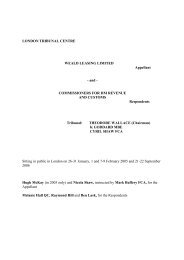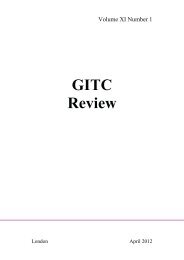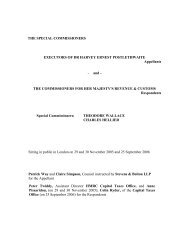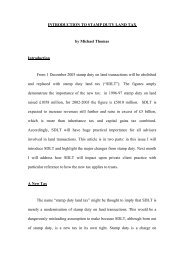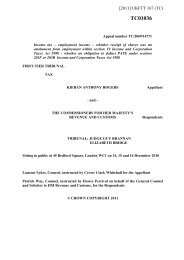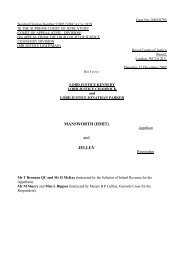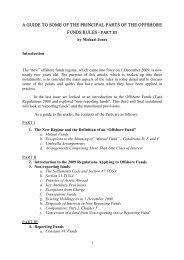Robert Gaines-Cooper v HMRC
Robert Gaines-Cooper v HMRC
Robert Gaines-Cooper v HMRC
Create successful ePaper yourself
Turn your PDF publications into a flip-book with our unique Google optimized e-Paper software.
Neutral Citation Number: [2007] EWHC 2617 (Ch)IN THE HIGH COURT OF JUSTICECHANCERY DIVISIONCase No: CH/2007/APP/0894Royal Courts of JusticeStrand, London, WC2A 2LLDate: 13 November 2007Before:THE HONOURABLE MR JUSTICE LEWISONBetween:ROBERT GAINES-COOPERAppellant- and –THE COMMISSIONERS FOR HM REVENUEAND CUSTOMSRespondentMr. Michael Flesch QC and Miss Nicola Shaw (instructed by Squire Saunders & Dempsey)for the Appellant.Miss Ingrid Simler QC and Mr. Akash Nawbatt (instructed by Solicitors for <strong>HMRC</strong>) for theRespondent.Hearing dates: 16, 17, 18 October 2007Judgment
Mr. Justice Lewison :Introduction ................................................................................................................................ 2The contest before the Special Commissioners ......................................................................... 2The decision ............................................................................................................................... 3The scope of an appeal ............................................................................................................... 8Domicile: the legal test ............................................................................................................ 13Residence and chief residence ............................................................................................. 13Wife and children ................................................................................................................. 17Mr <strong>Gaines</strong>-<strong>Cooper</strong>’s marriages ................................................................................................ 17Dilona Lantang..................................................................................................................... 17Jane Laye-Sion ..................................................................................................................... 18The Seychellois witnesses........................................................................................................ 19Other factual criticisms ............................................................................................................ 20The plastics factory .............................................................................................................. 20The coup d’état .................................................................................................................... 21Bois Noir .............................................................................................................................. 21Connections with England ....................................................................................................... 21Result ....................................................................................................................................... 23Introduction1. Given that many people move about the world from one country to another, it isessential to have a means of establishing under which system of law and within thejurisdiction of which country's courts questions relating to their civil status (such asmarriage, divorce and legitimacy) and some aspects of their property (such as thedevolution of moveable property on their intestacy) fall to be determined. It is toaccomplish that purpose that the concept of domicile has been developed. It is aneutral rule of law for determining that system of personal law with which anindividual has the appropriate connection, so that it will govern his personal status andquestions relating to him and his affairs. Its essential feature is that it attempts toconnect a person so far as it is possible with the country in which he has hispermanent home or in which he lives indefinitely. But in addition to the principalobjective of the law of domicile, it also has knock-on effects, such as a person’sliability to pay tax. That is what this appeal is about.2. The Special Commissioners (Dr Nuala Brice and Mr Charles Hellier) decided that Mr<strong>Gaines</strong>-<strong>Cooper</strong> was domiciled in England and Wales during the tax years from1992/93 to 2003/04. Mr <strong>Gaines</strong>-<strong>Cooper</strong>, being dissatisfied with that decision in pointof law, appeals against it. His appeal is restricted to questions of law only.The contest before the Special Commissioners3. It is common ground that Mr <strong>Gaines</strong>-<strong>Cooper</strong>’s domicile of origin was England andWales. The contest before the Special Commissioners was between the continuationof Mr <strong>Gaines</strong>-<strong>Cooper</strong>’s domicile of origin (as alleged by <strong>HMRC</strong>) and the acquisitionby him of a domicile of choice in the Seychelles in 1976 (as alleged by Mr <strong>Gaines</strong>-<strong>Cooper</strong>). <strong>HMRC</strong> did not allege that if Mr <strong>Gaines</strong>-<strong>Cooper</strong> had acquired a domicile of
choice in the Seychelles in 1976 he had subsequently abandoned it. Nor did Mr<strong>Gaines</strong>-<strong>Cooper</strong> allege that if he had not acquired a domicile of choice in theSeychelles in 1976 he had subsequently done so.4. The Special Commissioners correctly described the legal issue before them ( 4) as:“whether the Appellant was domiciled in England during thetax years from 1992/93 to 2003/04”5. They correctly recorded Mr <strong>Gaines</strong>-<strong>Cooper</strong>’s factual case on that issue ( 111) asfollows:“It was the Appellant's case that he abandoned his domicile oforigin in England and acquired a domicile of choice in theSeychelles in 1976 and that that domicile of choice hadsubsisted at all times since then.”6. In addition to the issue of domicile during the relevant tax years, the SpecialCommissioners were also required to decide whether Mr <strong>Gaines</strong>-<strong>Cooper</strong> was“resident” or “ordinarily resident” in the United Kingdom during those years. Theydealt with these issues in a separate section of their decision. But Mr Flesch QC, whoappears for Mr <strong>Gaines</strong>-<strong>Cooper</strong>, says that they made errors of law in formulating thelegal test that they purported to apply in deciding the question of domicile. He saysthat in two respects the Special Commissioners’ self-direction was wrong. He alsosays that on the facts found and the unchallenged evidence, the only true andreasonable conclusion is that Mr <strong>Gaines</strong>-<strong>Cooper</strong> acquired a domicile of choice in theSeychelles in 1976 or thereabouts. Since the Special Commissioners reached acontrary conclusion, it must be inferred that they made an error of law. There are,therefore two potential points of law, one “pure” and one “applied”.The decision7. I will have to deal with some of the Special Commissioners’ findings of fact in duecourse; but simply to put their conclusions in context I give the bare bones of the storynow. Mr <strong>Gaines</strong>-<strong>Cooper</strong> had a domicile of origin in England and Wales. In the 1970she began to visit the Seychelles and in 1975 he bought a house there known as BoisNoir. Also in 1975, in order to obtain a residence permit he constructed and thereafteroperated a plastics factory in the Seychelles. He also retained, through the medium ofan offshore company, a house and farmland in England. He was granted a residencypermit for the Seychelles in 1976. In 1979 Mr <strong>Gaines</strong>-<strong>Cooper</strong> married Ms DilonaLantang in Amsterdam. He bought a house in California which was to be thematrimonial home. However, the marriage deteriorated after a very short time, and adivorce followed. In 1993 Mr <strong>Gaines</strong>-<strong>Cooper</strong> remarried. He had met his second wifeJane in the Seychelles in 1975. She is a Seychellois but had come to study and thenwork in England. The marriage took place in England in 1993. In the following yearMrs <strong>Gaines</strong>-<strong>Cooper</strong> applied for naturalisation as a British subject. Their son Jameswas born in England in 1998 and went to school in England until 2005. Substantialworks were carried out to Mr <strong>Gaines</strong>-<strong>Cooper</strong>’s English house in the early 1990s andto Bois Noir in 1996. The Special Commissioners also made findings about thenumber of days that Mr <strong>Gaines</strong>-<strong>Cooper</strong> spent in the Seychelles and the UKrespectively.
8. Having set out the evidence and their findings at considerable length, the SpecialCommissioners turned to the law. No criticism is made of the summary in paragraphs114 to 118 of the decision. In paragraph 119 they said:“It is clear that, in considering the requirements of residenceand of intention, it is necessary to look at all the evidence.”9. In paragraph 120 they said:“The totality of the evidence can include conduct after the dateof the alleged acquisition of a domicile of choice.”10. Having stated the principle, they then considered the twin requirements of residenceand intention. So far as the question of residence is concerned, they decided that therelevant inquiry, in a case where a person has a residence in more than onejurisdiction, is which of them is his chief or principal residence. They summarisedwhat they considered to be the correct legal principles (which amounted to their selfdirection)as follows ( 132):“From the authorities we conclude that a domicile of choice isacquired by the combination of residence and the intention ofpermanent or indefinite residence and in reaching a decision itis necessary to look at the totality of the evidence, includingevents which occurred after the claimed acquisition of adomicile of choice. Residence for the purposes of the law ofdomicile means physical presence as an inhabitant but where aperson resides in two countries it is necessary to look at all thefacts in the light of the principle that a person who retains aresidence in his domicile of origin can acquire a domicile ofchoice in a new country only if the residence established in thatnew country is his chief residence. There must also be theintention of permanent and indefinite residence: adetermination to make the alleged domicile of choice his homewith the intention of establishing himself and his family thereand ending his days in that country.”11. I have italicised the two parts of that self-direction that Mr Flesch criticises. So far asthe first is concerned, Mr Flesch says that while it is possible to look at evidencesubsequent to the relevant date in considering the question whether the propositus hadthe necessary intention for the acquisition of a domicile of choice, it is impermissibleto look at such evidence for the purpose of determining whether he had the necessaryresidence. So far as the second passage is concerned, Mr Flesch says that if thepropositus has no family (in the sense of a nuclear family or a wife and children) atthe time that he says he has acquired a domicile of choice, then his intentions asregards his family are irrelevant to the question whether he has the intention necessaryto support the acquisition of a domicile of choice.12. The Special Commissioners then applied their self direction to the facts they hadfound. Their conclusions are detailed, and it is necessary to set them out fully. Theyfirst considered whether Mr <strong>Gaines</strong>-<strong>Cooper</strong>’s “chief residence” was in the Seychelles.They concluded:
“138 In favour of the Appellant is the fact that the Appellanthas had a residence in the Seychelles for more than 30 years.The Appellant purchased Bois Noir as a furnished house in1976 and after the renovations which were completed in 1998that residence now has a certain quality. The Appellant wisheshis ashes to be scattered there. He met his future wife in theSeychelles. His papers are, since 2004, kept there. In his 1977will he declared that he was domiciled in the Seychelles. Hehas social, religious and charitable associations with theSeychelles. He likes living in a warm climate. He planted acoco-de-mer plant there in February 1976.139 However, the fact is that the Appellant has always retaineda house in the United Kingdom and that is where his familylived in the period relevant to this appeal. In reaching adecision we have to look at the totality of the evidence.Residence for the purposes of the law of domicile meansphysical presence as an inhabitant and in our view the evidencesupports the conclusion that the Appellant has, and has alwayshad, a physical presence both in England and the Seychelles.His domicile of origin was England and he retained at all timesa presence here which had the quality of residence. He can onlyacquire a domicile of choice in the Seychelles if the residenceestablished in that new country is his chief residence.140 We regard as significant the fact that nearly all of theAppellant's connections with the United Kingdom were locatedin a comparatively small area of the contiguous counties ofBerkshire and Oxfordshire. In that small area the Appellant wasborn and went to school and his mother lived there until herdeath in 2004. Also in that same small area the Appellantmarried (twice), purchased two houses (Grove House and laterOld Place); invested in at least two farms (the Goose WillowEstate and Tanners Farm); had business offices (first at CedarCourt and later at Northfield House for which companiesassociated with the Appellant paid £1.5M); had a number of oldfriends; attended Royal Ascot; and attended shooting events.Mrs Jane <strong>Gaines</strong>-<strong>Cooper</strong> also had very many connections in thesame locality. She attended Padworth College, Berkshire andwas then employed in Reading, Berkshire. Before her marriageto the Appellant she lived locally and after her marriage lived atOld Place. James went to school in Henley-on-ThamesOxfordshire.141 We also regard the 1999 will (which is the Appellant'spresent will) to be of some significance. It was prepared byEnglish solicitors; it is to be construed and take effectaccording to English law; and the persons appointed to be theguardians of James live in the United Kingdom. Similarly, theagreement of 23 November 1988 to exploit the invention of the
laryngeal mask created a trust for the benefit of beneficiariesnamed in a will of the Appellant admitted to probate inEngland. Also, of course, the Appellant has always retained hisBritish citizenship and did not apply for citizenship in theSeychelles. Mrs Jane <strong>Gaines</strong>-<strong>Cooper</strong> applied for Britishcitizenship.142 We accept that subjectively the Appellant regardsPlantation Bois Noir as his chief residence but we adopt thewords of Scarman J in Fuld at 692B that "a wealthy mancannot, by his interested declarations, alter the facts of his life".Objectively the facts do not support the conclusion that theSeychelles or Bois Noir was the Appellant's chief residence. Heoccupies a substantial house with land in England and his wife(and his son since his birth in 1998) lived here until 2005.England remained the centre of gravity of his life and hisinterests. His chief residence was in England. We do not agreewith the argument of the Appellant that his chief residence hadto be in the Seychelles from 1976 because there was no homein the United Kingdom available for his use because in 1976Grove House was rented out. At almost the same time thatGrove House was rented out (1976 to 1980) Bois Noir wasrented out also (1976 to 1979) and the reason for both rentalswas because the Appellant was in Canada pursuing theCanadian venture and later because he had another house and awife in California. The evidence did not, even in this period,when the Appellant spent materially more time in theSeychelles than in England, persuade us that the Seychellesrather than Canada, California or England was his chiefresidence.”13. They then considered his intention. They concluded:“143 There must also be the intention of permanent andindefinite residence and a determination to make the allegeddomicile of choice his home with the intention of establishinghimself and his family there and ending his days in thatcountry. But one thing that the Appellant has not done is toestablish his family principally in the Seychelles. We regard assignificant that Mrs Jane <strong>Gaines</strong>-<strong>Cooper</strong>, although aSeychellois by birth, has chosen to live in England since 1977.The Appellant admitted that one reason why Grove House wassold and Old Place was purchased was because he hoped topersuade Mrs Jane <strong>Gaines</strong>-<strong>Cooper</strong> to marry him. There was noevidence before us that Mrs Jane <strong>Gaines</strong>-<strong>Cooper</strong> intended forthe foreseeable future to make her chief residence in theSeychelles. Mrs Jane <strong>Gaines</strong>-<strong>Cooper</strong>'s intentions do notdetermine the Appellant's intentions as they are independentpeople. But the Appellant is much attached to his wife and webelieve he had the intention to spend time with her. Her
possible ambivalence made it harder to conclude that heintended indefinitely to reside in the Seychelles (and that theSeychelles was his chief residence). Finally, the fact that inaggregate since 1975 the Appellant has spent most of his timeat places other than the Seychelles, (although not all in theUnited Kingdom) is not indicative of the residence of theAppellant in the Seychelles as being permanent and indefinite.144 We also do not agree that the building of the plasticsfactory in the Seychelles proved an intention to changedomicile. The factory was built in order to obtain a residencepermit and, compared with other successful ventures of theAppellant, was never very successful until about 1996 when itstarted to assemble laryngeal masks. The effort put by theAppellant into maintaining his Seychelles venture, latterlyrebuilding the factory and locating some laryngeal maskassembly there, is evidence of some considerable attachment tothe Seychelles but it did not make the Seychelles the centre ofhis business operations or of his life which centre, in therelevant period, was in England. The pursuit of the Seychellesfactory, despite its limited success, is evidence of a wish of theAppellant to retain his connection with the Seychelles but notconclusive of an indefinite intention to remain there. Hissuccessful businesses were in Canada, California, Italy andEngland. We also do not agree that the Appellant spent moretime in the Seychelles than in England. On the facts we havefound he in fact spent more time in England than in theSeychelles at least during the years under appeal.145 We accept that from 1976 to about 1980 the days spent bythe Appellant in the Seychelles were more numerous than thedays spent by him in England but in deciding whether heabandoned his domicile of origin in 1976 we are entitled tolook at all the facts including events after that date. There mayhave been a change in the pattern in 1976 but there have beenmany changes since all of which lead us to conclude that theAppellant did not abandon his domicile of origin. Overall webelieve that the Appellant at all relevant times intended toretain a presence in England for an indefinite period. He mayalso have intended to maintain a physical presence in theSeychelles for the indefinite future, but his chief residence wasin England.146 We adapt the words of Scarman J in Fuld at 692E and findthat in fact the Appellant never did wholly reject England nor,indeed, that small part of it located in Berkshire andOxfordshire where he had so many ties and connections; on thecontrary he felt its pull upon his affections and interests all hisdays. We also adapt the words of Hoffmann J in Plummer at707f and accept that the Appellant likes, nay loves, the
The scope of an appealSeychelles and enjoys all the amenities of the island of Mahéwhen he is there, quite apart from enjoying the beautiful housewhich Bois Noir has become since the renovations which werecompleted in 1998. We do not underestimate the part which theSeychelles plays in his thinking. Nevertheless theseconsiderations do not outweigh the substantial and continuingpart which presence in England played in his life.”14. Miss Simler QC, appearing for <strong>HMRC</strong>, submitted that the question whether a personhas acquired a domicile of choice is a question of fact. Unless it can be said, eitherthat the Special Commissioners’ self-direction was legally flawed, or that there wasno evidence to support one or more of their crucial findings of fact, the appeal mustfail. Mr Flesch agreed with this as far as it went. But he submitted that the SpecialCommissioners would have committed an error of law if their conclusion was not theonly true and reasonable conclusion on the basis of the facts found and theunchallenged evidence.15. Mr Flesch relied on the well-known statement of principle in Edwards v Bairstow[1956] AC 14 in which Lord Radcliffe said:“If the case contains anything ex facie which is bad law andwhich bears upon the determination, it is, obviously, erroneousin point of law. But, without any such misconception appearingex facie, it may be that the facts found are such that no personacting judicially and properly instructed as to the relevant lawcould have come to the determination under appeal. In thosecircumstances, too, the court must intervene. It has no optionbut to assume that there has been some misconception of thelaw and that, this has been responsible for the determination. Sothere, too, there has been error in point of law. I do not thinkthat it much matters whether this state of affairs is described asone in which there is no evidence to support the determinationor as one in which the evidence is inconsistent with andcontradictory of the determination, or as one in which the trueand only reasonable conclusion contradicts the determination.Rightly understood, each phrase propounds the same test. Formy part, I prefer the last of the three, since I think that it israther misleading to speak of there being no evidence tosupport a conclusion when in cases such as these many of thefacts are likely to be neutral in themselves, and only to taketheir colour from the combination of circumstances in whichthey are found to occur.”16. Lord Radcliffe deals both with a case in which there is no evidence to support thedetermination; and also a case in which the evidence is inconsistent with andcontradictory of the determination. He treats them both as facets of the sameprinciple; namely that it must be inferred that the fact finding tribunal made an errorof law. However, in speaking of a case in which the evidence is contradictory of the
determination, he must plainly have been confining himself to evidence that the factfindingtribunal accepted as true.17. In Georgiou v Customs & Excise Commissioners [1996] STC 463 Evans LJ said:“There is a well-recognised need for caution in permittingchallenges to findings of fact on the ground that they raise thiskind of question of law. That is well seen in arbitration casesand in many others. It is all too easy for a so-called question oflaw to become no more than a disguised attack on findings offact which must be accepted by the courts. As this casedemonstrates, it is all too easy for the appeals procedure to theHigh Court to be misused in this way. Secondly, the nature ofthe factual inquiry which an appellate court can and doesundertake in a proper case is essentially different from thedecision-making process which is undertaken by the tribunal offact. The question is not, has the party upon whom rests theburden of proof established on the balance of probabilities thefacts upon which he relies, but, was there evidence before thetribunal which was sufficient to support the finding which itmade? In other words, was the finding one which the tribunalwas entitled to make? Clearly, if there was no evidence, or theevidence was to the contrary effect, the tribunal was not soentitled.It follows, in my judgment, that for a question of law to arise inthe circumstances, the appellant must first identify the findingwhich is challenged; secondly, show that it is significant inrelation to the conclusion; thirdly, identify the evidence, if any,which was relevant to that finding; and, fourthly, show that thatfinding, on the basis of that evidence, was one which thetribunal was not entitled to make. What is not permitted, in myview, is a roving selection of evidence coupled with a generalassertion that the tribunal's conclusion was against the weightof the evidence and was therefore wrong. A failure toappreciate what is the correct approach accounts for much ofthe time and expense that was occasioned by this appeal to theHigh Court.” (Emphasis added)18. Again it seems to me that when Evans LJ spoke of evidence to the contrary effect hemust have been referring to evidence that the fact finding tribunal accepted as true.19. As an illustration of the application of these principles, Mr Flesch drew my attentionto the decision of the Court of Appeal in Barclays Mercantile Business Finance Ltd vMawson [2003] STC 66. The issue in the case was whether Barclays were entitled tocapital allowances in respect of expenditure which it said was expenditure in theacquisition of a gas pipeline for the purposes of its trade. The Revenue contended thatthe series of agreements under which Barclays acquired an interest in the pipeline wasan artificial tax scheme with no commercial justification; whereas Barclays said that itwas a standard commercial finance leasing transaction. The Special Commissionersand the judge found in favour of the Revenue, but the Court of Appeal reversed their
decisions. Part of the crucial reasoning which underlay the Court’s decision was thatthe Special Commissioners had made a finding of fact (viz. that the transactions hadno commercial reality) that they were not entitled to make. Peter Gibson LJ pointedout that three distinguished witnesses gave evidence on behalf of the taxpayer beforethe Special Commissioners; but apart from recording that fact “the SpecialCommissioners make only brief references to their evidence”. The Revenue called noevidence, but cross-examined the three witnesses. Having summarised the evidenceof the three witnesses Peter Gibson LJ said:“[32] In the light of that evidence from apparently impeccablewitnesses whose evidence is not said by the SpecialCommissioners to be disbelieved, it is not apparent to me onwhat evidence the findings [that the transactions had nocommercial reality] are based. They appear to be an acceptanceof the Revenue’s assertions…”20. Peter Gibson LJ continued by saying that it was of course open to the SpecialCommissioners to reject the evidence of a witness but they would have been bound toexplain why; and he pointed out that this was not a case in which they were choosingbetween conflicting evidence, because the Revenue had called none. The ultimatefinding of the Special Commissioners was “simply not supported by any written ororal evidence” ( 34). The decision of the Court of Appeal was upheld by the Houseof Lords on grounds which do not affect this point: [2005] STC 1. It is true that theCourt of Appeal looked at the raw material that had been placed before the SpecialCommissioners, both in written and oral form. But the conclusion that they reachedwas that there was no evidence to support the Special Commissioners’ finding of fact;in other words classic Edwards v Bairstow territory.21. It is of course, as Peter Gibson LJ recognised, for the Special Commissioners toevaluate the evidence before them. In the course of a long hearing (and this one tookten days of which more than four days were occupied by Mr <strong>Gaines</strong>-<strong>Cooper</strong>’s ownevidence) it is impossible for them to record all the evidence that has been given. Anappeal court must also respect the impression that the witnesses made on the factfinding tribunal. In the present case the Special Commissioners specificallycommented on Mr <strong>Gaines</strong>-<strong>Cooper</strong>’s evidence as follows:“7 Before finding the facts we comment on the evidence of theAppellant. The Appellant gave evidence for four and a halfdays of the ten day hearing. As many of our findings dependupon his oral evidence we have to say how we found him as awitness. We accept that the Appellant did his best to be truthfuland honest but he also readily admitted that he made mistakes.For this reason we looked for corroborating documentaryevidence but an unusual feature of this appeal was that much ofthe oral evidence of the Appellant was digressive anddiscursive and unsupported by any documents. Some of theevidence related to events as far back as 1971 which is nowthirty-five years ago. The Appellant had an impressive memorybut was not always certain about dates. We accept that someuncertainty about dates is to be expected after such an intervalof time.
8 However, the Appellant also sometimes appeared to confuseone of his business ventures with another. The Appellant toldus that he had set up (with other business associates) probablyin excess of 100 companies all over the world. The names ofvery many companies were mentioned in oral evidence but notwith great precision and without reference to documents. Thesame comment applies to trusts. A number of different trustswere mentioned but full supporting documentation was notproduced. For the purpose of these preliminary issues absoluteaccuracy about dates and the names of the Appellant'scompanies and trusts is not required. Where appropriate,therefore, we have referred to dates as approximate dates and tocompanies and trusts descriptively rather than by specificnames because we are not confident that all the dates andnames given in oral evidence were accurate.9 For these reasons we approach the oral evidence of theAppellant with some caution. We bear in mind that the burdenof proof in these appeals is on the Appellant.”22. Mr Flesch fastened on the Special Commissioners’ statement that Mr <strong>Gaines</strong>-<strong>Cooper</strong>“did his best to be truthful and honest”. He said that while the Special Commissionersdid make criticisms of Mr <strong>Gaines</strong>-<strong>Cooper</strong>’s evidence, those criticisms were aninadequate foundation for their overall conclusion that they should approach hisevidence with caution, especially where his evidence concerned his subjectiveintentions about which, Mr Flesch said, Mr <strong>Gaines</strong>-<strong>Cooper</strong> had not been muddled ormistaken. It is sometimes necessary to distinguish between an honest witness and atruthful one. An honest witness may not be telling the truth, for he may be mistaken.That is the reason why juries are warned against deciding guilt on the basis ofidentification evidence. The very honesty of the witness may make it all the morenecessary to test the accuracy of his honestly given evidence (cf. R v Turnbull [1977]QB 224). Moreover all fact finders are aware of honest witnesses who persuadethemselves that what actually happened in the past conforms to their current view ofhow things ought to have happened. This does not impugn the honesty of theirevidence, but it may impugn its accuracy or truthfulness. It is, perhaps, difficult toimagine a witness who tries (and fails) to be honest; but there is no difficulty inunderstanding the notion of a witness who tries (and fails) to be truthful. The SpecialCommissioners described Mr <strong>Gaines</strong>-<strong>Cooper</strong> as a witness who did his best to betruthful and honest. They did not say that he succeeded in being both; and indeed theircomments on his tendency to make mistakes shows clearly that he failed in his honestattempt to be truthful. It is true that some of the Special Commissioners’ criticismrelated to dates; but dates were of critical importance in the case. Moreover thecomment that much of Mr <strong>Gaines</strong>-<strong>Cooper</strong>’s evidence was discursive and digressive isa general comment on his evidence. That is not, however, the only point at which theSpecial Commissioners commented on Mr <strong>Gaines</strong>-<strong>Cooper</strong>’s evidence. In paragraph134 they said:“The evidence of the Appellant was that on moving to theSeychelles in February 1976 he firmly believed and intendedthat he would live out his days in the Seychelles and that was
still his wish. He had never had the desire to return to live inEngland and he believed that he had acquired a domicile ofchoice in the Seychelles. He regarded Plantation Bois Noir ashis principal residence and his home. Although he had to travelextensively on business, the Seychelles became his true homein the mid-1970s and had remained so ever since. It was wherehe intended to spend the remainder of his days. We haveconsidered this evidence in the light of the totality of the factswe have found.”23. The last sentence makes clear that the Special Commissioners were not necessarilygoing to accept Mr <strong>Gaines</strong>-<strong>Cooper</strong>’s evidence about his intention. Having consideredthe totality of the facts they concluded:“Overall we believe that the Appellant at all relevant timesintended to retain a presence in England for an indefiniteperiod. He may also have intended to maintain a physicalpresence in the Seychelles for the indefinite future, but his chiefresidence was in England.”24. Clearly they did not accept his evidence, especially that part of his evidence in whichhe said that he had never had the desire to return to live in England. Whether theywere right or wrong in reaching that conclusion is irrelevant to an appeal limited to aquestion of law.25. In my judgment the Special Commissioners’ evaluation of Mr <strong>Gaines</strong>-<strong>Cooper</strong> as awitness demonstrates no error of law. They were entitled to conclude that his evidenceshould be approached with caution. Accordingly, I reject the submission that theSpecial Commissioners’ findings of fact can be supplemented by evidence that Mr<strong>Gaines</strong>-<strong>Cooper</strong> gave but which the Special Commissioners did not expressly reject.26. There are, however, some specific findings that Mr Flesch vigorously criticised towhich I will return in due course. It is convenient to recall, at this stage, the generalapproach of an appeal court to findings of fact made by a lower court. As LordHoffmann put it in Biogen Inc v Medeva plc [1997] RPC 1:“The need for appellate caution in reversing the judge'sevaluation of the facts is based upon much more solid groundsthan professional courtesy. It is because specific findings offact, even by the most meticulous judge, are inherently anincomplete statement of the impression which was made uponhim by the primary evidence. His expressed findings are alwayssurrounded by a penumbra of imprecision as to emphasis,relative weight, minor qualification and nuance (as Renan said,la vérité est dans une nuance), of which time and language donot permit exact expression, but which may play an importantpart in the judge's overall evaluation.”27. This, of course, was said in the context of an appeal where the appeal court has, atleast in principle, the power to reverse a judge’s evaluation of the facts. In the presentcase, by contrast, I have no such power. I must be satisfied, not that the Special
Commissioners’ evaluation of the facts was wrong, but that they made an error of law.All the more need, then, for caution.Domicile: the legal test28. The classic statement of the nature of a domicile is that of Lord Chelmsford in Udny vUdny (1869) LR 1 HL 441, 458:“Domicil of choice is a conclusion or inference which the lawderives from the fact of a man fixing voluntarily his sole orchief residence in a particular place, with an intention ofcontinuing to reside there for an unlimited time.”29. It is important to remember that a person must always have a domicile; and,conversely, he may only have one domicile at a time. It follows, therefore, that therewill (at least in theory) be a particular moment in time at which his domicile changesif he acquires a domicile of choice which replaces his domicile of origin. Before thatmoment, his domicile will have been his domicile of origin. After that moment it willbe his domicile of choice. Locating the moment may be a difficult question of fact. Itis also necessary to recall (as Ms Simler submitted) that a person’s domicile of originis particularly “adhesive”.Residence and chief residence30. As I have said, Mr Flesch’s submission is that while it is possible to look at evidencesubsequent to the relevant date in the question whether the propositus had thenecessary intention for the acquisition of a domicile of choice, it is impermissible tolook at such evidence for the purpose of determining whether he had the necessaryresidence. There is no authority which supports this stark distinction.31. In Bremer v Freeman (1857) 3 Moo PC 306 the issue was whether Fanny Allegri dieddomiciled in France, where she had lived from 1842 until her death in 1853. LordWensleydale, giving the advice of the Privy Council said:“Whatever question may have arisen, if the deceased had diedin 1842, her subsequent residence for eleven years gave acharacter to her prior residence, and proved that domicile hadcommenced at that time.”32. Thus conduct which took place after the date of the alleged acquisition of a domicileof choice was relevant to determining the character of a person’s residence. Thequestion whether a person’s residence in a particular territory is his chief residence is,as it seems to me, a question of the character of his residence in that territory.33. In Re Grove (1888) 40 Ch D 216 Lopes LJ said that the law was that “in order todetermine a person’s intention at a given time, you may regard not only conduct andacts before and at the time, but also conduct and acts after the time, assigning to suchconduct and acts their relative and proper weight and cogency.” However, the factthat Lopes LJ’s observations are directed to intention does not mean that eitherexpressly or impliedly he was saying that you cannot look at subsequent conduct forthe purpose of determining someone’s residence.
34. In addition in the present case it is necessary to give some further consideration to theconcept of “chief residence”. In IRC v Bullock [1976] STC 409 Buckley LJ said:“A man may have homes in more than one country at one time.In such a case, for the purpose of determining his domicile, afurther enquiry may have to be made to decide which, if any,should be regarded as his principal home.”35. Since this postulates two homes, it is clear that the Lord Justice was considering morethan just physical presence in two or more territories.36. In IRC v Duchess of Portland [1982] STC 149 Nourse J considered the case of ataxpayer who had homes in both England and Quebec. He said that residence for thepurposes of the law of domicile is “physical presence in [a] country as an inhabitantof it.” While residence of short duration may be enough to support the acquisition of adomicile where a person abandons one country for another, Nourse J went on to say:“But that state of affairs is inherently improbable in a casewhere the domiciliary divides his physical presence betweentwo countries at a time. In such a case it is necessary to look atall the facts in order to decide which of the two countries is theone he inhabits.”37. In the Duchess of Portland’s case the factual question was whether the Duchess hadacquired a domicile of choice in Quebec on her annual visit in 1974. In order todecide that question Nourse J reviewed the pattern of her life between 1948 (when shemarried and came to England) and 1978 (which was the last year of assessmentconcerned in that case). He did not distinguish between looking at “all the facts” forthe purpose of deciding the question of residence on the one hand, and the question ofthe necessary intention on the other.38. In the Duchess of Portland’s case Nourse J glossed the requirement of “residence” as“physical presence … as an inhabitant.” Mr Flesch did not suggest that this gloss waswrong. This gloss does not seem to me to maintain the rigid separation betweenresidence on the one hand, and intention to stay on the other, for which Mr Fleschargued. Once the quality of physical presence comes into the picture, that quality can(only) be evaluated by an examination of the conduct of the propositus over a moreprolonged period.39. In Plummer v IRC [1987] STC 698 Hoffmann J held that a person who retains aresidence in his domicile of origin can acquire a domicile of choice in a new countryonly if the residence established in that country is his chief residence. Theformulation of the applicable test in Udny requires both a chief residence and also anintention to continue to reside indefinitely. Thus the question whether a person’sresidence is his chief residence is part of the first limb of the test rather than thesecond. The test is predicated on the fact that a person has a residence in each of thecompeting territories. Plainly, therefore, residence alone is not enough to satisfy thefirst limb of the test where a person has two or more residences. If a person has twoor more residences in different territories, which is his chief one? In Plummer itselfthe taxpayer’s complaint was that the Special Commissioners had paid attention onlyto the “day count” and had ignored the quality of her presence in each country.
Hoffmann J said that that was not a fair reading of their decision; but it seems to methat he did not reject the submission that both the day count and the quality ofpresence were of importance in determining which of two or more residences is aperson’s chief residence. Again, it seems to me that if the fact finder is required todetermine which of two residences is a person’s chief residence, then the tribunalmust look at the evidence over a more prolonged period than might otherwise be thecase.40. In Agulian v Cyganik [2006] EWCA Civ 129 the question was whether Mr AndreasNathanael (Andreas) had acquired a domicile in England at the date of his death. Hehad in fact been resident in England for some 43 years before his death in 2003,although he also owned two flats in Cyprus, which was his domicile of origin. Thefactual contention was that he had acquired a domicile of choice in England between1995 and 1999. Mummery LJ (with whom the other members of the court agreed)said ( 27):41. He also said ( 46):“As the deputy judge found that Andreas abandoned hisdomicile of origin in Cyprus and acquired a domicile of choicein England between 1995 and 1999, it is necessary to examinein detail the facts found about Andreas's English connection,focusing on his life events in that period, but viewed, of course,in the context of his life as a whole.”“First, the question under the 1975 Act is whether Andreas wasdomiciled in England and Wales at the date of his death.Although it is helpful to trace Andreas's life eventschronologically and to halt on the journey from time to time totake stock, this question cannot be decided in stages. Positionedat the date of death in February 2003 the court must look backat the whole of the deceased's life, at what he had done with hislife, at what life had done to him and at what were his inferredintentions in order to decide whether he had acquired adomicile of choice in England by the date of his death. SörenKierkegaard's aphorism that "Life must be lived forwards, butcan only be understood backwards" resonates in thebiographical data of domicile disputes.”42. It is true that the latter quotation is more overtly concerned with intention than withresidence, but Mummery LJ did not limit his observations to intention; nor did he inthe first of the two quotations. Mr Flesch said that it was because the legal issue waswhether Andreas was domiciled in England at the date of his death, that Mummery LJsaid that the court must position itself at the date of death and look backwards. MrFlesch said that Mr <strong>Gaines</strong>-<strong>Cooper</strong>’s case was “the complete opposite” because it washis case that he had acquired a domicile of choice during the critical period. In myjudgment this is a false contrast. The legal issue before the Special Commissionerswas whether Mr <strong>Gaines</strong>-<strong>Cooper</strong> was domiciled in England during the years ofassessment under appeal. That is the comparator with the legal issue in Agulian vCyganik. The factual issue was whether Mr <strong>Gaines</strong>-<strong>Cooper</strong> acquired a domicile ofchoice in the critical period. But in Agulian v Cyganik the factual issue was whether
Andreas had acquired a domicile of choice between 1995 and 1999, some four yearsbefore his death. In my judgment Agulian v Cyganik cannot be distinguished on thisground.43. In addition, Mr Flesch’s submission carried the seeds of its own destruction. The casefor Mr <strong>Gaines</strong>-<strong>Cooper</strong> was that he acquired a domicile of choice in the Seychelles in1976. But Mr Flesch said that in considering the question whether Mr <strong>Gaines</strong>-<strong>Cooper</strong>’s chief residence was in the Seychelles, the Special Commissioners werewrong in law in looking at evidence outside what Mr Flesch described as “the criticalperiod” (i.e. 1976 to 1980). Although the reason for the selection of the start of thecritical period was clear (Mr <strong>Gaines</strong>-<strong>Cooper</strong>’s acquisition of a residence permit) thereason for the selection of the end of the critical period was justified by no more thanpragmatism. If Mr Flesch’s submission on the law is correct, what justification canthere be for having a “critical period” at all? The very fact that a critical period isrelied on demonstrates that one cannot determine a person’s chief residence merely bytaking a snapshot at a particular moment in time. It seems probable, as a matter ofcommon sense, that the further one gets from the point at which a domicile of choiceis alleged to have been acquired, the less cogent will be any inference that one candraw from conduct. But that is a question of evaluating the evidence, rather thansaying that it is irrelevant.44. Whatever may be the case where the propositus has only one residence at any giventime, in the case where he has two or more I reject the submission that the fact findingtribunal is confined to a snapshot. In my judgment the Special Commissioners madeno legal error in looking at evidence outside “the critical period” in order to help themdecide which was Mr <strong>Gaines</strong>-<strong>Cooper</strong>’s chief residence in 1976.45. Mr Flesch had a subsidiary submission on the question of “chief residence”. He saidthat the competing residences must be available residences, in the sense that thepropositus has an unfettered and immediate ability to live in the residence in question.If, therefore, one of the competing residences is let, it cannot be a chief residence foras long as the letting endures. Mr Flesch submitted that since Mr <strong>Gaines</strong>-<strong>Cooper</strong>’sEnglish property was let between 1976 and 1980 it could not have been Mr <strong>Gaines</strong>-<strong>Cooper</strong>’s chief residence during that period. Since the only competitor for the title ofchief residence was Bois Noir, it follows, by a process of elimination that Bois Noirmust have been Mr <strong>Gaines</strong>-<strong>Cooper</strong>’s chief residence during the critical period. Thereare two reasons why I reject this submission. First, it assumes that everyone musthave a chief residence at any given time. I do not see why that should be so. Althougheveryone must have a domicile at any given time, the domicile of origin will endureor revive, even if the propositus does not have a chief residence in his territory oforigin, or indeed anywhere. The question for the Special Commissioners was notwhich of England and the Seychelles was Mr <strong>Gaines</strong>-<strong>Cooper</strong>’s chief residence; butwhether his chief residence was in the Seychelles. That, in my judgment, is a subtlydifferent question. Second, I do not accept that a residence ceases to be a person’schief residence simply because it is let out. If a person domiciled in England takes aforeign posting for, say, three months and lets out his English home in the meantime,it is no misuse of language to say that his English home remains his chief residenceduring that three month period. I might also add that, as the Special Commissionersfound, Bois Noir was let out at almost the same time as the English property. So if the
English property does not qualify as Mr <strong>Gaines</strong>-<strong>Cooper</strong>’s chief residence, nor doesBois Noir.Wife and children46. The only other part of the Special Commissioners’ self-direction that Mr Fleschcriticised was their summary of the necessary intention as “a determination to makethe alleged domicile of choice his home with the intention of establishing himself andhis family there and ending his days in that country”. Mr Flesch’s point was that at thedate when Mr <strong>Gaines</strong>-<strong>Cooper</strong> claims to have acquired a domicile of choice in theSeychelles, he had no family in the sense of a wife and children. I agree with MrFlesch that if the Special Commissioners were using the word “family” to refer to theparents or siblings of the propositus, then they would have been in error. But I do notthink that that is what they meant at all. They attached weight to what happened whenMr <strong>Gaines</strong>-<strong>Cooper</strong> married (twice). The quotation from the Special Commissioners’decision is one which they themselves took from the judgment of Buckley LJ inBullock. Buckley LJ in his turn took it from the speech of Lord Macnaghten inWinans v A-G [1904] AC 287, 291; and Lord Macnaghten himself took it from thespeech of Lord Cairns in Bell v Kennedy (1868) LR 1 HL Sc 311. If the SpecialCommissioners were wrong, they were in very distinguished company.47. In my judgment the quality of intention that is necessary to support the acquisition ofa domicile of choice is the same quality whether the propositus is single or married.The young bachelor who sets off with his rucksack on his back and settles in a newterritory can acquire a domicile of choice there if he has the necessary intention. Ofcourse it is necessary to describe the quality of that intention in words. And even inthe case of a young bachelor, it is no misuse of language to say that the quality ofintention is that he must have the intention of establishing himself and his family (ifhe acquires one) in the new territory. In determining whether at any given time thepropositus did have that quality of intention, it is in my judgment legitimate toexamine what in fact happened when the propositus did acquire a wife and family.Mr <strong>Gaines</strong>-<strong>Cooper</strong>’s marriagesDilona Lantang48. The Special Commissioners said of Mr <strong>Gaines</strong>-<strong>Cooper</strong>’s first marriage ( 32):“In 1979 the Appellant married, for the first time, Ms DilonaLantang who was a citizen of both the Netherlands andIndonesia. The marriage took place in Amsterdam and laterthere was a service at St Andrew's Church, Sonning, nearReading. Sir James Mancham was one of the guests. Also in1979 the Appellant purchased a house in California and boththe Appellant and Mrs Dilona <strong>Gaines</strong>-<strong>Cooper</strong> lived there. Forabout a year after the marriage Mrs Dilona <strong>Gaines</strong>-<strong>Cooper</strong> usedto visit the Seychelles with the Appellant; after that shepreferred to be in California. Mrs Dilona <strong>Gaines</strong>-<strong>Cooper</strong> onlyvisited the Seychelles occasionally and would then go on tovisit Singapore. The marriage was dissolved in 1986.”49. In summarising their conclusion they said ( 53):
“From 1979 to 1986 the Appellant was married to Mrs Dilona<strong>Gaines</strong>-<strong>Cooper</strong> and lived with her at a house in California.”50. Mr Flesch was very critical of this finding; and said that it did not do justice to thereal state of affairs. He said that the unchallenged evidence was that Mr <strong>Gaines</strong>-<strong>Cooper</strong>’s first marriage broke down after about a year. To put it another way, what hewas saying was that there was no evidence to support the Special Commissioner’sfinding that Mr <strong>Gaines</strong>-<strong>Cooper</strong> and his first wife lived together in California afterabout 1980. There is, I think, some force in Mr Flesch’s criticism, but it does not takehim far. Reverting to what Mr Flesch called “the critical period” (viz. 1976 to 1980)there was ample material, even on Mr <strong>Gaines</strong>-<strong>Cooper</strong>’s own evidence, to justify afinding that Mr <strong>Gaines</strong>-<strong>Cooper</strong>’s matrimonial home was in California from the date ofhis marriage in 1979 to the end of the critical period.51. The other side of the coin is that the Special Commissioners also found that Bois Noirin the Seychelles was let between 1976 and 1979. Mr Flesch had some criticisms ofthe way in which the Special Commissioners compared the periods of letting of BoisNoir on the one hand, and Mr <strong>Gaines</strong>-<strong>Cooper</strong>’s English property on the other. Butthese were criticisms at the margin and do not affect the Special Commissioners’central finding of fact about the letting of Bois Noir. The period in which the home inCalifornia was the matrimonial home included, even on Mr <strong>Gaines</strong>-<strong>Cooper</strong>’sevidence, a period after the letting of Bois Noir had come to an end.52. In short, therefore, on the facts found by the Special Commissioners (and evenaccepting Mr Flesch’s point about Mr <strong>Gaines</strong>-<strong>Cooper</strong>’s first marriage) Mr <strong>Gaines</strong>-<strong>Cooper</strong>’s house in the Seychelles was let between 1976 and 1979; and for at least thefollowing year he lived in California.Jane Laye-Sion53. The Special Commissioners recorded that Mr <strong>Gaines</strong>-<strong>Cooper</strong> and Miss Laye-Sionfirst met in the Seychelles in 1975. They became friendly, although there was aconsiderable disparity in age between them. In 1977 Miss Laye-Sion left theSeychelles and came to the United Kingdom to complete her education. She was aboarder at Padworth College near Reading, to which Mr <strong>Gaines</strong>-<strong>Cooper</strong> hadintroduced her. They found as a fact that in 1979 “Miss Laye-Sion took her final A-level examination and decided to stay in the United Kingdom.” ( 57). Also in 1979adverse political pressure led to Miss Laye-Sion's family (her mother, father, sisterand two brothers) selling their house in the Seychelles and setting up home in theUnited Kingdom. ( 58). Mr <strong>Gaines</strong>-<strong>Cooper</strong> and Miss Laye-Sion married in Henley in1993. In their summary the Special Commissioners said that “We regard as significantthat Mrs Jane <strong>Gaines</strong>-<strong>Cooper</strong>, although a Seychellois by birth, has chosen to live inEngland since 1977.” Mr Flesch criticised that findings on two grounds: first that in1977 Miss Laye-Sion was sent to England to complete her education, and hence itwas not her choice; and second, that her decision to remain in England was in partmotivated by the political pressure (in fact a coup d’état in the Seychelles) to whichthe Special Commissioners referred. Neither of these criticisms can, in my judgment,be categorised as revealing an error of law. The fact remains that, for whateverreason, Miss Laye-Sion lived in England from 1977 onwards; that Mr <strong>Gaines</strong>-<strong>Cooper</strong>,as the Special Commissioners found, bought a house in England in 1988 in the hope
that he could persuade Miss Laye-Sion to marry him; and that when they did marry,they married in England.54. Mr Flesch said that when, in 1976, Mr <strong>Gaines</strong>-<strong>Cooper</strong> claimed to have formed theintention to settle indefinitely in the Seychelles, he could not have foreseen how muchtime he and Miss Laye-Sion would spend in England. Thus, he said, the SpecialCommissioners should have accepted Mr <strong>Gaines</strong>-<strong>Cooper</strong>’s evidence about hisintention in 1976. That, as it seems to me, is a pure question of fact. That the SpecialCommissioners did not accept Mr <strong>Gaines</strong>-<strong>Cooper</strong>’s evidence on that point reveals noerror of law.The Seychellois witnesses55. Mr <strong>Gaines</strong>-<strong>Cooper</strong> called a number of independent witnesses in support of his case,many of whom knew him in the Seychelles. Mr Flesch’s criticism of the SpecialCommissioners was that “in one short paragraph they utterly fail to do justice” to theirevidence. Whether the Special Commissioners did or did not do justice to theevidence of these witnesses is, in my judgment, a pure question of fact. It was for theSpecial Commissioners to decide, as part of their fact-finding exercise, whether theevidence of these witnesses helped them to decide the questions they had to consider.It is here, in particular, that even the most meticulous of fact finding tribunals cannotbe expected to set out all the evidence that they heard. Moreover, in my judgment, MrFlesch’s criticisms understated the extent to which the Special Commissioners didindeed find and take into account facts which they found as a result of this evidence.56. The paragraph that Mr Flesch fastened on was paragraph 136 in which the SpecialCommissioners said:“The evidence of Mr Guy Morel was that the Appellant was"definitely settled" in the Seychelles and that "his heart wasthere" The evidence of Sir James Mancham was that he thoughtof the Appellant as being domiciled in the Seychelles: "hebelongs here and is regarded by all as Seychellois". Theevidence of Mrs Geva René was that the Appellant "wasconsidered a Seychellois" by the people there; it was heropinion that the Appellant had made his home in the Seychellesand had told her that he wanted to end his days there. Mr Pughtold us that the Appellant "always regarded the Seychelles ashis home; although he travelled extensively on business, he wasalways anxious to get back home to the Seychelles". We bear inmind that Mr Pugh only lived in the Seychelles between 1976and 1980. Bishop French stated that his conversations with theAppellant over the years left him in no doubt that theSeychelles was where he considered his home to be. We bear inmind that the Appellant first met Bishop French in 1993. MrCurtis-Bennett told us that the Appellant considered theSeychelles to be his home and was of the view that theAppellant would never leave the Seychelles. Mr Victor Lohsaid that he did not believe that the Appellant would ever stopliving in the Seychelles; it was his home and he had too manyroots there. Mr Landon expressed the opinion that the
Appellant was at home in the Seychelles which he alwaysreferred to as home; in his view the Appellant would die in theSeychelles. All the witnesses spoke very highly of the helpgiven by the Appellant to charities and good causes in theSeychelles.”57. In commenting on this evidence the Special Commissioners said ( 137):“However, in considering this evidence we bear in mind thatthe witnesses admitted that they knew very little of theAppellant's life outside the Seychelles and, as will be clearfrom the facts we have found, the Appellant also retainedsubstantial ties with England as well as interests in Canada, theUnited States and many other countries. We regard theevidence of these witnesses, therefore, as of relevance to theAppellant's attachment to the Seychelles rather thanestablishing the place of his principal attachment.”58. Mr Flesch said that the Special Commissioners had understated the extent to whichthese witnesses gave evidence about Mr <strong>Gaines</strong>-<strong>Cooper</strong>’s life outside the Seychelles.First, this is a submission on a pure question of fact. Second, this submission does notdetract from the Special Commissioners’ finding that the witnesses admitted that theyknew little of Mr <strong>Gaines</strong>-<strong>Cooper</strong>’s life outside the Seychelles. Third, the SpecialCommissioners did make findings about these witnesses’ visits to Mr <strong>Gaines</strong>-<strong>Cooper</strong>in England. I have already quoted the finding that Sir James Mancham was a guest atMr <strong>Gaines</strong>-<strong>Cooper</strong>’s first marriage, which took place in Amsterdam and England.They also found ( 35) that if Mr <strong>Gaines</strong>-<strong>Cooper</strong> :“had friends from the Seychelles who were visiting the UnitedKingdom he would, on occasion, invite them to stay at GroveHouse. Sometime in the 1980s Mr Morel visited Grove Houseand saw three Rolls-Royce Phantom cars, a Bentley and oneother motor car. Sir James Mancham also visited the Appellantat Grove House.”59. It is clear that in reaching their conclusion the Special Commissioners took intoaccount the facts that they had found.Other factual criticismsThe plastics factory60. The Special Commissioners found ( 20) that in order to acquire a residence permit inthe Seychelles Mr <strong>Gaines</strong>-<strong>Cooper</strong> arranged for the incorporation of a company andthe construction of a plastics factory which opened in February 1977. It manufacturedwater bottles and plastic bags but was not very profitable ( 21). Because the plasticsfactory was not very successful Mr <strong>Gaines</strong>-<strong>Cooper</strong> developed other businesses inCalifornia in mid-1977( 30-31). In 1987 the plastics factory began to manufacturelaryngeal masks ( 42); but the government confiscated the factory in 1989, andmanufacturing was transferred to the USA ( 43) and some time later to England (45). The government returned the factory (together with substantial compensation) in
1994, since when it has been rebuilt ( 75). The new factory manufactures laryngealmasks and has done since 2001 ( 76).61. Mr Flesch submits that the plastics factory is the only constant and enduring factor inMr <strong>Gaines</strong>-<strong>Cooper</strong>’s business life in the period from 1976 to date (apart from the fiveyears when it was confiscated). However, the Special Commissioners were wellaware of the facts they had found in relation to the plastics factory. They dealt with itin paragraph 144, which I have already quoted. Whether they were right or wrong intheir treatment of the plastics factory is a pure question of fact. It certainly cannot besaid that they overlooked it.The coup d’état62. Mr Flesch placed reliance on the suggestion that unlike most expatriates Mr <strong>Gaines</strong>-<strong>Cooper</strong> remained in the Seychelles after the coup d’état in 1977. In fact, according tohis witness statement he was in Canada at the time, and Bois Noir remained let fornearly two years afterwards. Whether the effect of the coup d’état was of significancein determining Mr <strong>Gaines</strong>-<strong>Cooper</strong>’s domicile was a matter of fact for the SpecialCommissioners. If they did not find it of significance, they had no need to discuss it.This is one of those cases in which the “penumbra of imprecision” is important.Bois Noir63. Mr Flesch also said that the Special Commissioners understated the magnificence ofBois Noir as a residence. He pointed to the fact that it was good enough for theresidence of the British High Commissioner in 1976. This too is a pure question offact. The Special Commissioners’ assessment of Bois Noir reveals no error of law.Connections with England64. Finally, it is worth summarising the Special Commissioners’ findings about Mr<strong>Gaines</strong>-<strong>Cooper</strong>’s continuing connections with England:i) Mr <strong>Gaines</strong>-<strong>Cooper</strong> was born in Reading on 27 September 1937 (11);ii)iii)iv)He retained his British citizenship and did not apply for citizenship in theSeychelles (11 and 141);In 1964, Mr <strong>Gaines</strong>-<strong>Cooper</strong> purchased a property known as Old Grove Housein Emmer Green. It was a five-gabled house with four bedrooms, built of brickand flint in about the 14 th Century and was a listed building. The gardenextended to about 0.6 acres. In the grounds was a 250 year old tithe barn ofabout 2,500 square feet. The buildings were in a bad state of repair. Mr<strong>Gaines</strong>-<strong>Cooper</strong> restored the house and moved into it in 1966 ( 13);Until 1976, Mr <strong>Gaines</strong>-<strong>Cooper</strong> used Old Grove House as his residence andkept paintings, vintage motor cars and guns there for his use ( 15);v) In or about 1971 the Isle of Man companies to which he had transferred all hisUK assets purchased a smallholding called Views Farm in Steventon,Berkshire with about 100 acres. The companies later purchased contiguouspieces of land until by 1974 they owned 700 acres and also rented 200 acres of
adjacent land. Mr <strong>Gaines</strong>-<strong>Cooper</strong> then built a substantial dairy for 350 cows.The name of Views Farm was changed to Willow Brook Farm and the wholeestate was called Goose Willow Estate ( 16);vi)vii)viii)ix)The estate employed a secretary who also acted as personal assistant to Mr<strong>Gaines</strong>-<strong>Cooper</strong> when he was in the United Kingdom ( 16);Mr <strong>Gaines</strong>-<strong>Cooper</strong> liked to visit the Estate when he was in the UnitedKingdom; he liked making hay and he liked the three shire horses which werekept there ( 16);Mr <strong>Gaines</strong>-<strong>Cooper</strong> did not sell Old Grove House in 1976. A schedule of assetsdated 30 November 1977 showed that by that time the Isle of Man companiesowned Old Grove House and its contents, including four paintings, a collectionof five vintage motor cars, some fine wine and some valuable guns. They alsoowned other real property in the United Kingdom, namely, North Park Farm,part of East Statford Farm, Tanners Farm and Goose Willow Estate ( 29);On 20 July 1977 Mr <strong>Gaines</strong>-<strong>Cooper</strong> executed a will. Although he declared inthat will that he was domiciled in the Seychelles, the will dealt only with hisUnited Kingdom assets; he did not at that time make any other will dealingwith his assets in the Seychelles ( 28);x) In 1977, Miss Laye-Sion came to the United Kingdom to complete hereducation at Padworth College near Reading following an introduction madeby Mr <strong>Gaines</strong>-<strong>Cooper</strong> ( 57);xi)xii)xiii)xiv)xv)Whilst at the College, Miss Laye-Sion met Mr <strong>Gaines</strong>-<strong>Cooper</strong> from time totime and on occasion went to Old Grove House ( 57);In 1979 Miss Laye-Sion completed her A-Levels and decided to stay in theUnited Kingdom. She started working for a business associate of Mr <strong>Gaines</strong>-<strong>Cooper</strong> in Reading and her family left the Seychelles in 1979 and came toEngland to set up home ( 58 - 59);In 1979, Mr <strong>Gaines</strong>-<strong>Cooper</strong> married for the first time. Although the marriagetook place in Amsterdam (his wife was a Dutch citizen) there was also aservice at St Andrew’s Church, Sonning, near Reading ( 32);Later in 1979 when Exchange Control was abolished, Mr <strong>Gaines</strong>-<strong>Cooper</strong> soldGoose Willow Estate but retained others assets in England including OldGrove House and its contents, including the paintings, the wine, the vintagecars and the guns ( 33);In 1981 various planning applications were made in respect of Old GroveHouse on Mr <strong>Gaines</strong>-<strong>Cooper</strong>’s behalf. One letter in 1981 stated Mr <strong>Gaines</strong>-<strong>Cooper</strong> “liked the property and the surroundings and was looking forward toliving at Grove House again on a permanent basis in due course”. Also in1981, in a notice of appeal against a refusal of permission, a statement wasmade by an agent that “Mr <strong>Gaines</strong>-<strong>Cooper</strong> would naturally prefer to secure a
tenant known personally to him to occupy his private residence during hisabsences abroad” (34);xvi)xvii)Some time after 1980 Old Grove House was occupied by a Mr Barber whoused one of the four bedrooms and paid some rent. During this time Mr<strong>Gaines</strong>-<strong>Cooper</strong> stayed at Old Grove House when he visited the UnitedKingdom. Also if he had friends who were visiting the United Kingdom hewould, on occasion, invite them to stay at Old Grove House ( 35);Correspondence addressed to Mr <strong>Gaines</strong>-<strong>Cooper</strong> was sent to Old Grove Houseand he collected it when he was in the United Kingdom ( 35);xviii) Sometime in the mid-1980s there was a separate letting of the tithe barn atGrove House to a Mr Ashley-Carter who ran a Rolls-Royce servicing companythere. From this period on Old Grove House itself was not let ( 36);xix)xx)xxi)In 1984 Miss Laye-Sion became a director of a company connected with Mr<strong>Gaines</strong>-<strong>Cooper</strong> ( 59);For some few years prior to her marriage in 1993 Miss Laye-Sion was in a“good and stable” relationship with Mr <strong>Gaines</strong>-<strong>Cooper</strong> ( 61);On 23 November 1988 Mr <strong>Gaines</strong>-<strong>Cooper</strong> entered into an agreement to exploitthe invention of the laryngeal mask. His address is recorded in the agreementas Old Grove House ( 44);xxii) At the beginning of 1989 Old Grove House was sold and at the end of 1988Old Place had been purchased “in its stead” ( 53). One of Mr <strong>Gaines</strong>-<strong>Cooper</strong>’s reasons for selling Old Grove House and purchasing Old Place wasbecause he hoped to persuade Miss Laye-Sion to marry him ( 61);xxiii) The furniture in Old Place came from Old Grove House. Mr <strong>Gaines</strong>-<strong>Cooper</strong>moved his vintage cars, paintings and valuable guns from Old Grove House toOld Place as well as his clothes for use in Europe ( 49).Result65. In the light of these findings of fact it is, in my judgment, impossible to say that theonly true and reasonable conclusion was that Mr <strong>Gaines</strong>-<strong>Cooper</strong> acquired a domicileof choice in the Seychelles in 1976. That, no doubt, was a possible conclusion but,having heard all the evidence it was not one to which the Special Commissionerscame. I have already quoted the lengthy and meticulous way in which the SpecialCommissioners evaluated the evidence in order to come to their conclusions. I can seeno error of law in their conclusions, and whether I think that there might have been anerror of fact is beside the point.66. Valiantly though Mr Flesch pressed Mr <strong>Gaines</strong>-<strong>Cooper</strong>’s case, he was in effectpresenting “a roving selection of evidence coupled with a general assertion that thetribunal's conclusion was against the weight of the evidence and was thereforewrong”. That is not permissible in an appeal restricted to questions of law. I dismissthe appeal.


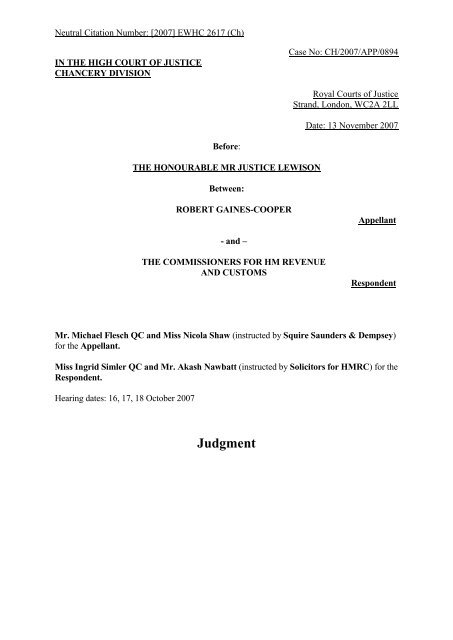
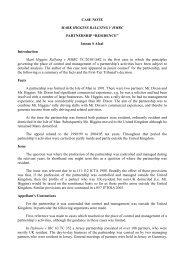
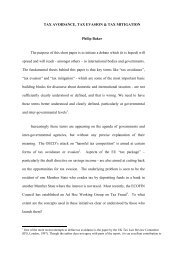
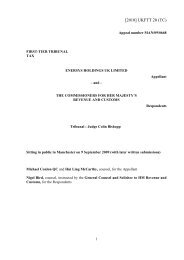
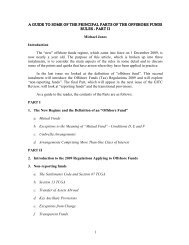
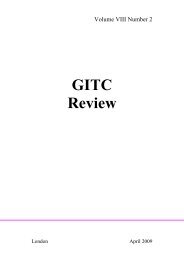
![Mohammed Siddiq Khan v. HMRC [2006] EWCA Civ 89](https://img.yumpu.com/45700564/1/184x260/mohammed-siddiq-khan-v-hmrc-2006-ewca-civ-89.jpg?quality=85)
